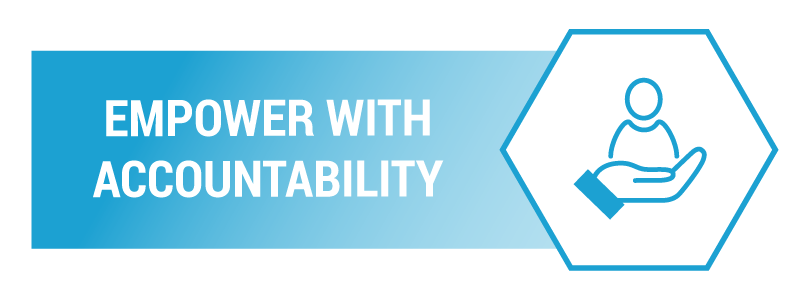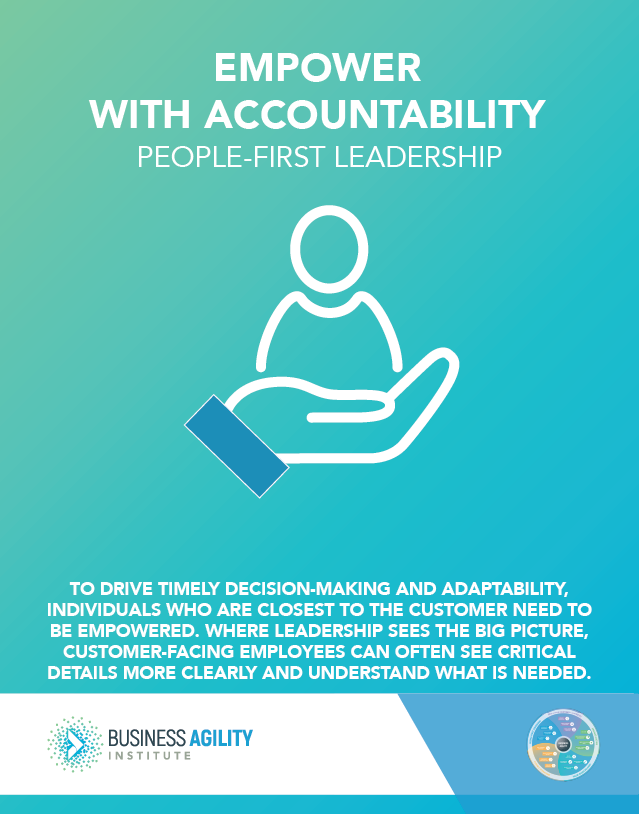Domains of Business Agility
- Responsive Customer-Centricity
- / Fiercely Champion The Customer
- / Sense & Respond Proactively
- / Integrate Diverse Ideas
- Engaged Culture
- / Cultivate A “Learning Organization”
- / Engage Transparently & Courageously
- / Embed Psychological Safety
- / Act As One
- Value-Based Delivery
- / Unleash Workflow Creatively
- / Prioritize. Prioritize. Prioritize.
- / Deliver Value Sooner
- / Seize Emergent Opportunities
- Flexible Operations
- / Adapt Strategies Seamlessly
- / Fund Work Dynamically
- / (Re)Organize Structures Fluidly
- / Balance Governance And Risk
- People-First Leadership
- / Foster Authentic Relationships
- / Empower With Accountability
- / Realize People’s Potential
To drive timely decision-making and adaptability, individuals who are closest to the customer need to be empowered. Where leadership sees the big picture, customer-facing employees can often see critical details more clearly. They understand what is needed, and, when empowered, can make a powerful impact at the customer and organizational level.
Empowerment allows individuals to contribute meaningfully through the mindsets of growth and ownership. However, empowerment without accountability is laissez-faire. And accountability without empowerment is just command and control. Empowerment with accountability requires balancing the two in order to become truly agile within your organization.
Primary Behaviors
The following 6 behaviors strongly contribute to the ability to empower with accountability.
B72: Leaders delegate decision authority to the lowest appropriate level based on risk: Rather than aggregate all decision authority at the highest levels, leaders assign clear responsibility for specific types of decisions at the level best suited to make the decision based on access to data, time sensitivity, and relative risk to the business and its goals. Expectations for communicating designs are clearly defined so that people get access to the outcome of the decision, without having to personally be involved in making it.
B73: Everyone takes ownership of business outcomes with the necessary authority, autonomy, and agency to do what it takes to achieve it: Everyone understands the goals that the organization is working to achieve for its customers and feels ownership for helping to achieve them. Everyone in the organization has the authority to act in the best interest of the customer and is able to exercise the autonomy to take action.
B74: Leaders hold teams and peers to account for the commitments they make: Teams and peers are given the opportunity to make their own commitments for their work, but are expected to account for their completion (or not) of their commitment. The approach is one of “celebration” for commitments that are met, and “learning” for commitments that are not (rather than punishment).
B75: Everyone makes decisions using common-sense judgment, guided by organizational principles and values, rather than extensively documented policies: Decision-making can be fast and consistent when everyone in the organization understands the process and criteria for decision-making. Connecting decision-making to organizational principles, values, and priorities allows decisions to be made quickly at the most appropriate level, without the delays of consulting (and maintaining) bureaucratic policies and procedures.
B76: Everyone regularly measures business outcomes and associated impacts: Outcomes are what our customers do as a result of our product or service. Impact is the benefit our organization, our customers, and the world gets because of the outcome delivered. While the specific metrics will vary between organizations and different products and services, they should always be expressed in terms of customer value and measured early and often (not tied to an artificial calendar). These are not "soft" metrics - they are actionable, relevant and provide insight into customer behavior and achievement of organizational goals.
B77: Leaders use stories to communicate, inspire, and influence: Leaders know that facts and data are only a small fraction of communication. Leaders craft and share vivid stories of customers, employees, and partners to connect listeners with both the emotion and logic underlying the business communication.


